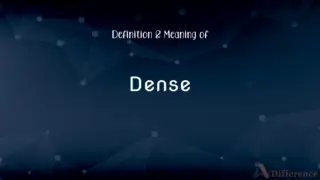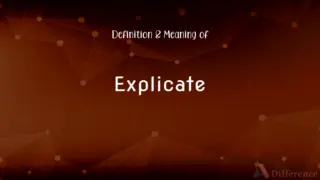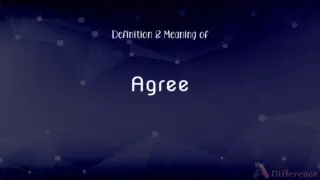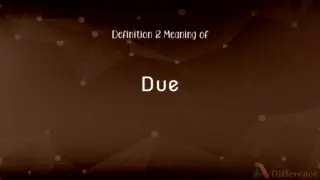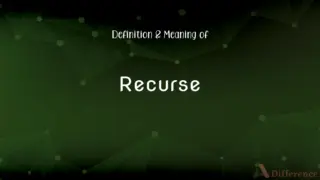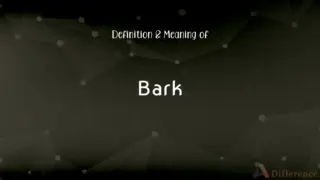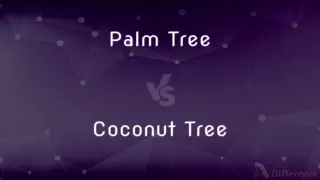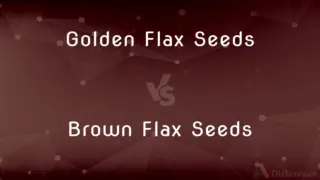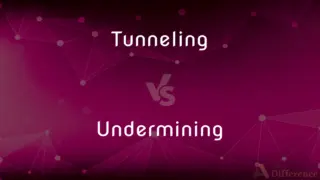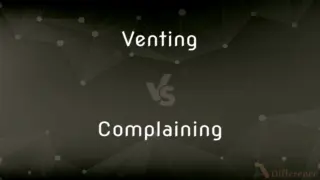Surmise Definition and Meaning
By Tayyaba Rehman & Fiza Rafique — Published on March 11, 2024
Surmise means to suppose that something is true without having evidence to confirm it. e.g., He could only surmise her true feelings after she left.

Table of Contents
Surmise Definitions
To make a conjecture or hypothesis.
Scientists often surmise theories before testing them empirically.
To deduce by slight evidence.
From the whispering, she surmised there was a surprise party for her.
To assume something is true without confirmation.
She surmised that her friend would arrive late, as usual.
To conclude something based on intuition.
He surmised that the secret meeting was about the merger.
To guess or hypothesize with little evidence.
They could only surmise the contents of the letter.
To come to think or believe something based on slight evidence.
Observing the patterns, she surmised a change in weather was imminent.
To guess something without having proof.
From the look on her face, I surmised she was not pleased.
To infer something from incomplete or uncertain evidence.
The detective surmised the motive behind the crime from the scattered clues.
To form an opinion or judgment without definitive evidence.
The jury had to surmise the defendant's intent.
To make a judgment about (something) without sufficient evidence; guess
"In another pocket he came across what he surmised in the dark were pennies, erroneously, however, as it turned out" (James Joyce).
To say (something) as a guess or conjecture.
To make a guess or conjecture.
An idea or opinion based on insufficiently conclusive evidence; a conjecture.
Thought, imagination, or conjecture, which may be based upon feeble or scanty evidence; suspicion; guess.
Surmises of jealousy or of envy
This opinion, however, is merely a surmise, which may or may not be the case.
Reflection; thought; posit.
To imagine or suspect; to conjecture; to posit with contestable premises.
If, as I surmise, you see the ladies this evening, you might mention my intended visit.
A thought, imagination, or conjecture, which is based upon feeble or scanty evidence; suspicion; guess; as, the surmisses of jealousy or of envy.
[We] double honor gainFrom his surmise proved false.
No man ought to be charged with principles he actually disowns, unless his practicies contradict his profession; not upon small surmises.
Reflection; thought.
To imagine without certain knowledge; to infer on slight grounds; to suppose, conjecture, or suspect; to guess.
It wafted nearer yet, and then she knewThat what before she but surmised, was true.
This change was not wrought by altering the form or position of the earth, as was surmised by a very learned man, but by dissolving it.
A message expressing an opinion based on incomplete evidence
Infer from incomplete evidence
Imagine to be the case or true or probable;
I suspect he is a fugitive
I surmised that the butler did it
To speculate or form a notion about something.
Based on the market trends, he surmised that the stocks would rise.
Surmise Snonyms
Assume
To take for granted or without proof.
He assumed she knew the way home.
Infer
To deduce or conclude information from evidence and reasoning.
From her tone, he inferred that she was upset.
Speculate
To form a theory without firm evidence.
Investors speculated that the company's value would increase.
Hypothesize
To propose a hypothesis.
The scientist hypothesized the existence of a new element.
Presume
To suppose something is the case on the basis of probability.
I presume you'll be attending the meeting.
Guess
To estimate or suppose something without sufficient information to be sure.
She had to guess the answer to the riddle.
Conjecture
To form an opinion or supposition about something on the basis of incomplete information.
Scholars often conjecture about the meaning of ancient texts.
Deduce
To derive as a conclusion from something known or assumed.
From the evidence, detectives deduced that the suspect was lying.
Theorize
To suggest or think of a theory, idea, etc., as a possibility.
He theorized that stress could be a factor in the disease.
Divine
To discover something by guesswork or intuition.
She divined that something was wrong based on his behavior.
Surmise Example Sentences
Without any real proof, she could only surmise his intentions.
From the historical data, economists surmise a coming recession.
Without direct communication, we had to surmise their plans.
The look on her face allowed him to surmise something was wrong.
Parents often surmise what their children need without being told.
Without seeing the test results, they could only surmise the diagnosis.
Common Curiosities
What is a stressed syllable in surmise?
The stressed syllable in "surmise" is the second syllable, -mise.
How do we divide surmise into syllables?
Surmise is divided into syllables as sur-mise.
How many syllables are in surmise?
There are two syllables in "surmise."
How is surmise used in a sentence?
Surmise is used to express an assumption or guess based on incomplete information, e.g., They could only surmise the cause of the accident.
Why is it called surmise?
It is called "surmise" because it involves forming an opinion based on incomplete or insufficient information.
What is the pronunciation of surmise?
Surmise is pronounced as /sərˈmaɪz/.
What is the root word of surmise?
The root of "surmise" is not clearly defined as it comes from Middle English (as a noun) via Old French from medieval Latin "suppositium," but the verb stems from the noun.
What is the second form of surmise?
The second form is "surmised," used as the past tense and past participle.
What is another term for surmise?
Another term for "surmise" is "speculation."
What is the verb form of surmise?
The verb form is "surmise" itself, as in "to surmise."
What is the first form of surmise?
The first form is "surmise," used as the present tense.
What is the singular form of surmise?
The singular form is "surmise."
Is surmise a noun or adjective?
Surmise can be a noun and also a verb but not an adjective.
What is the opposite of surmise?
The opposite of "surmise" is "know" or "certainty."
Is surmise a negative or positive word?
"Surmise" is neutral; it can be used in both positive and negative contexts depending on the assumption.
Is surmise a vowel or consonant?
The word "surmise" starts with a consonant.
Is the word “surmise” a Direct object or an Indirect object?
"Surmise" can function as a direct object in a sentence, e.g., "He made a surmise."
Which vowel is used before surmise?
Typically, the article "a" is used before "surmise" because it starts with a consonant sound.
What is the third form of surmise?
The third form is "surmised," functioning as the past participle.
Is surmise a countable noun?
Yes, "surmise" is a countable noun; you can have multiple surmises.
Is the word surmise a Gerund?
No, "surmise" is not a gerund. The gerund form would be "surmising."
What is the plural form of surmise?
The plural form is "surmises."
Is the word surmise imperative?
The word "surmise" can be used in an imperative form, e.g., "Surmise the outcome," but it is not inherently imperative.
Which determiner is used with surmise?
Determiners like "a," "the," and "my" can be used with "surmise," depending on the context.
Is surmise an abstract noun?
Yes, when used as a noun, "surmise" is an abstract noun since it refers to an idea or concept rather than a physical object.
Is the surmise term a metaphor?
The term "surmise" itself is not a metaphor but can be used metaphorically in certain contexts.
Which article is used with surmise?
The indefinite article "a" is used when referring to a single instance of surmise, and "the" for specific references.
What part of speech is surmise?
"Surmise" can be both a noun and a verb.
Is surmise an adverb?
No, "surmise" is not an adverb.
Is surmise a collective noun?
No, "surmise" is not a collective noun.
Which preposition is used with surmise?
Prepositions such as "about" and "from" can be used with "surmise," e.g., "surmise about" or "surmise from."
Which conjunction is used with surmise?
Conjunctions like "that" can be used with "surmise," e.g., "He surmised that..."
Share Your Discovery

Previous Term
Canvas Definition and Meaning
Next Term
Withstand Definition and MeaningAuthor Spotlight
Written by
Tayyaba RehmanTayyaba Rehman is a distinguished writer, currently serving as a primary contributor to askdifference.com. As a researcher in semantics and etymology, Tayyaba's passion for the complexity of languages and their distinctions has found a perfect home on the platform. Tayyaba delves into the intricacies of language, distinguishing between commonly confused words and phrases, thereby providing clarity for readers worldwide.
Co-written by
Fiza RafiqueFiza Rafique is a skilled content writer at AskDifference.com, where she meticulously refines and enhances written pieces. Drawing from her vast editorial expertise, Fiza ensures clarity, accuracy, and precision in every article. Passionate about language, she continually seeks to elevate the quality of content for readers worldwide.









